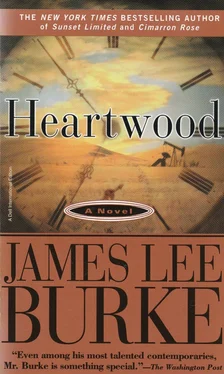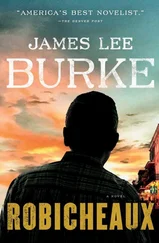James Burke - Heartwood
Здесь есть возможность читать онлайн «James Burke - Heartwood» весь текст электронной книги совершенно бесплатно (целиком полную версию без сокращений). В некоторых случаях можно слушать аудио, скачать через торрент в формате fb2 и присутствует краткое содержание. Жанр: Полицейский детектив, на английском языке. Описание произведения, (предисловие) а так же отзывы посетителей доступны на портале библиотеки ЛибКат.
- Название:Heartwood
- Автор:
- Жанр:
- Год:неизвестен
- ISBN:нет данных
- Рейтинг книги:4 / 5. Голосов: 1
-
Избранное:Добавить в избранное
- Отзывы:
-
Ваша оценка:
- 80
- 1
- 2
- 3
- 4
- 5
Heartwood: краткое содержание, описание и аннотация
Предлагаем к чтению аннотацию, описание, краткое содержание или предисловие (зависит от того, что написал сам автор книги «Heartwood»). Если вы не нашли необходимую информацию о книге — напишите в комментариях, мы постараемся отыскать её.
Heartwood — читать онлайн бесплатно полную книгу (весь текст) целиком
Ниже представлен текст книги, разбитый по страницам. Система сохранения места последней прочитанной страницы, позволяет с удобством читать онлайн бесплатно книгу «Heartwood», без необходимости каждый раз заново искать на чём Вы остановились. Поставьте закладку, и сможете в любой момент перейти на страницу, на которой закончили чтение.
Интервал:
Закладка:
Heartwood
James Lee Burke
1
It would be easy to say we resented Earl Deitrich because he was rich. Maybe to a degree we did. He grew up in River Oaks, down in Houston, in an enormous white mansion set up on a hillock surrounded by shade trees. Its size and seclusion separated it even from the Midas levels of wealth that characterized his few neighbors. But our problem with him was not simply his money.
He was an officer, on leave from the army, when he came to the town of Deaf Smith, up in the Texas hill country, where the working classes wrestled drill bits and waited tables and the new rich chewed on toothpicks at the country club. He used his wealth to hold up a mirror to our inadequacies and take Peggy Jean Murphy from our midst, then brought her back to us as his wife and possession, almost as though she were on display.
Peggy Jean Murphy, who was heart-breakingly beautiful, who lived in our dreams, who commanded such inclusive respect the roughest kids in the West End dared not make a loose remark about her lest they be punched senseless by their own kind.
Earl Deitrich made us realize that our moments on the dance floor with her at high school proms and the romantic fantasies we entertained about marriage to her had always been the vanity of blue-collar kids who had never been in the running at all. Maybe even the high school quarterback she'd loved before he'd been drafted and killed on the Mekong had not been in the running, either.
But that was a long time ago. I tried not to think about Peggy Jean anymore. She and Earl lived abroad and in Montana much of the year and I didn't have occasion to see them, or to regret the decisions that led me into law enforcement on the border and the months of unrecorded and officially denied nocturnal raids into Coahuila, where a playing card emblazoned with the badge of the Texas Rangers was stuffed into the mouths of the dead.
But try as I might, I would never forget the spring afternoon when Peggy Jean got down from the back of my horse and walked with me into a woods above the river and allowed me to lose my virginity inside her.
When I rose from her hot body, her pale blue eyes were empty, staring at the clouds above the pine tops. I wanted her to say something, but she didn't.
"I don't guess I got a lot of experience at this," I said.
She ran her hand down my arm and held my fingers. There were blades of grass on her shoulders and breasts.
"You were fine, Billy Bob," she said.
Then I knew she had not made love to me but to a soldier who had died in Vietnam.
"You want to go to a movie tonight?" I asked.
"Maybe tomorrow," she replied.
"I like you a whole lot. I know when you lose somebody, it takes a long-"
"We'd better go back now. We'll go to the movie tomorrow. I promise," she said.
But no one competes well with ghosts. At least no one in our town did, not until Earl Deitrich arrived.
Earl and Peggy Jean's house was rumored to have cost twelve million dollars to build. It was three stories high, concave in shape, inset in a scooped-out hillside, the yard terraced with tons of flagstone. The front was filled with windows the size of garages, framed by white-painted steel beams. Ninety-foot skinned and lacquered ponderosa logs were anchored at angles from the roof to the ground, so that at a distance the house looked like a giant, gold-streaked tooth couched in the hills.
It was spring, on a Thursday, when I drove my Avalon out to their house for lunch. I had never felt comfortable around Earl, even though I did my best to like him, but she had left a handwritten note in the mailbox at my law office, saying they were back in town and would love to see me.
So I drove across the old iron bridge on the river, back into the hills, then through a cattleguard and down a long green valley whose fields were covered with buttercups and bluebonnets and Indian paintbrush. As I approached the house I saw a sun-browned, blond man in khakis and scuffed boots and a cut-off denim shirt setting fence posts around a horse lot that had been nubbed down to dirt.
His name was Wilbur Pickett and he had failed at almost every endeavor he had ever undertaken. When he tried to borrow money to start up a truck farm, his own mother told everybody in town Wilbur couldn't grow germs on the bottom of his shoe.
He wildcatted down in Mexico and set fire to a sludge pit next to the rig, then the wind blew the flames through a dry field and burned down the local police chief's ranch house. Wilbur barely got back across the border with his life.
In the Flint Hills of eastern Kansas, after a blistering 110-degree day, he unloaded an eighteen-wheeler full of hogs in rest pens without noticing the rails were down on the far side. Then watched them fan across the hills into three counties under a sky spiderwebbed with lightning.
But when it came to horses and bulls, Wilbur could come out of a rodeo chute like his pants were stitched to their hides. He broke mustangs in Wyoming and went seven seconds with Bodacious, the most notorious bull on the professional circuit (Bodacious would pitch the rider forward, then rear his head into the rider's face and crush the bones in it). Wilbur's face had to be rebuilt with metal plates, so that it now looked chiseled, the profile and jawline faintly iridescent, as though there were chemicals in his skin.
I stopped my car and waited for him to walk over to the window. His gray, shapeless cowboy hat was sweat-stained around the base of the crown. He took it off and wiped his brow and smiled.
"I got a pipeline deal down in Venezuela. Twenty or thirty grand can get you in on the ground floor," he said.
"I bet," I said.
"How about sluice mining in British Columbia? I'm talking about float gold big as elks' teeth, son."
"How's the weather up there in January?"
"Beats the hell out of listening to rich people tell you how much money they got," he said.
"See you, Wilbur."
"Jobbing out like this? Temporary situation. I'm fixing to make it happen."
He grinned, full of self-irony, and pulled his work gloves from his back pocket and knocked the dust out of them against his palm.
Peggy Jean and Earl had other guests that afternoon, too-a United States congressman, a real estate broker from Houston, a member of the state legislature, their wives, and a small, nervous, dark-haired man with a hawk's nose and thick glasses and dandruff on the shoulders of his blue suit.
Peggy Jean wore a white sundress with purple and green flowers on it. She had always been a statuesque girl and the years had not affected her posture or figure. There was a mole by the side of her mouth, and her hair was the color of mahogany, so thick and lustrous you wanted to reach out and touch it when she walked by.
She saw me looking at her from across the room. I went into the kitchen with her and helped her make a pitcher of iced tea and a second pitcher of lemonade. She washed a bowl of mint from the garden, then trimmed the sprigs with scissors and handed me two of them to put in the lemonade. The tips of her fingers were wet when she touched my palm.
"Earl's going to talk business with you," she said.
"He can talk it all he wants," I said.
"You don't do civil law?"
"Not his kind."
"He can't help where his family's money came from," she said.
"You're looking great, Peggy Jean," I said.
She picked up the tray and walked ahead of me onto the side porch, which was furnished and built to look like an eating area in a simple home of sixty years ago. The walls were unpainted slat board, the ceiling posts wood and lathed with bulbous undulations in them; the long plank table was covered with a checkered cloth; an old-time icebox, with oak doors and brass handles, stood in the corner; a bladed fan turned lazily overhead. I stood by the open window and looked at Wilbur Pickett dropping a shaved and beveled fence post into a hole.
Читать дальшеИнтервал:
Закладка:
Похожие книги на «Heartwood»
Представляем Вашему вниманию похожие книги на «Heartwood» списком для выбора. Мы отобрали схожую по названию и смыслу литературу в надежде предоставить читателям больше вариантов отыскать новые, интересные, ещё непрочитанные произведения.
Обсуждение, отзывы о книге «Heartwood» и просто собственные мнения читателей. Оставьте ваши комментарии, напишите, что Вы думаете о произведении, его смысле или главных героях. Укажите что конкретно понравилось, а что нет, и почему Вы так считаете.












